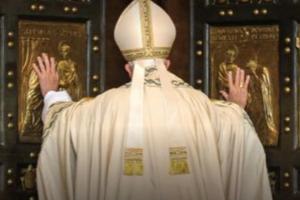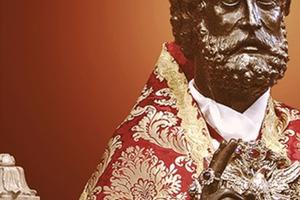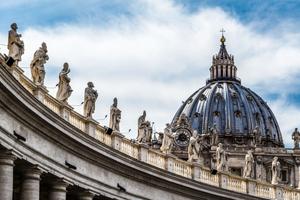Cardinal Ribat: Personal Holiness ‘Very Important’ in the Next Pope
The cardinal from Papua New Guinea says the Church needs a holy and unifying pope to guide the Church and inspire renewed faith around the world.

VATICAN CITY — The archbishop of Port Moresby, Papua New Guinea, said Tuesday that the cardinals had been considering the necessary qualities for the next successor of Peter; and, for him, a high level of personal sanctity as well as being a unifying figure will be paramount.
“Personal holiness is very important for the next pope,” Cardinal John Ribat told reporters as he exited Tuesday morning’s General Congregation.
“He must be someone open and controlling — not in a bad way, but in a way that keeps us all together, journeying together in unity,” he added.
Asked by the Register what main issues were discussed at this morning’s meeting, Cardinal Ribat said the focus was on “Church issues” and looking at “what Pope Francis did and also what we should be doing.” Also mentioned, he said, were issues related to “youth, other cultures, religions and things Pope Francis was working to address,” along with “synodality.”
Cardinal Ribat, 68, was one of the few cardinals willing to speak to the media as they left through the Porta del Perugino entrance beside the Holy Office. A prelate with a passion for social justice, the environment and ecumenism, he is his country’s first cardinal, elevated to the cardinalate by Pope Francis in 2016.
The cardinal said it was too early to say from which country the new pope will likely be chosen. “We haven’t really got on to discussing where we need the pope to come from,” Cardinal Ribat said. “That is still open,” he added, and he recalled a cardinal saying, “We already have a pope among us, but we don’t know who he is and where he comes from.”
He was also unable to predict how long or short the conclave would last, saying it was of course dependent on “if everyone is for one candidate or for many — we’ll have to decide on that.”
Sixth Session
The April 29 General Congregation was the sixth session since the cardinals began last week. The congregations are meetings of all the cardinals, electors and non-electors, where they discuss a variety of matters. The Vatican said today that 183 cardinals were present at the sixth session, including 124 cardinal-electors. Around 20 cardinals took the floor to speak.
Having agreed on logistical issues and the start date of the conclave last week, the General Congregations have turned to important issues related to the present needs of the Church, the state of the Curia and its work, and the challenges facing the Church, the world and the next pope. They will continue until the beginning of the conclave, set for May 7.
At a press conference on Tuesday, Vatican spokesman Matteo Bruni said the cardinals addressed “themes related to the Church and the challenges it faces, offering reflections shaped by the perspectives of their continents and regions of origin, as well as the Church’s possible responses.” Bruni also confirmed the news on Monday that Cardinal Giovanni Angelo Becciu would obey the will of Pope Francis and not take part in the conclave.
Following Tradition
The Vatican confirmed Tuesday that the conclave will follow the same schedule as the previous one in 2013, with Cardinal Giovanni Battista Re, dean of the College of Cardinals, presiding at the votive “Mass for the Election of the Pope” (Pro Eligendo Papa), on May 7 at 10 a.m. in St. Peter’s Basilica.
The conclave itself will officially begin at 4:30 p.m.; and, as per tradition, a prayer service will be held in the Pauline Chapel, attended by the cardinal-electors who will pray the Litany of the Saints before entering in procession into the Sistine Chapel.
They will sing the Veni Creator Spiritus and then make their solemn oath to faithfully fulfill the munus Petrinum (“Petrine ministry”) if they are elected pope and to maintain absolute secrecy regarding the conclave.
- Keywords:
- the next pope
- papacy


















